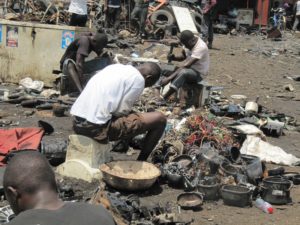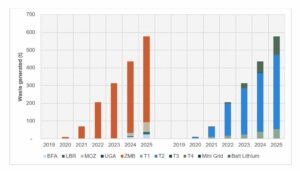27.08.2020 | Insight
The Beyond the Grid Fund for Africa (BGFA) was established in 2019 with the aim to accelerate the creation of sustainable markets for distributed and stand-alone off-grid energy services in rural and peri-urban Africa based on the on-going Beyond the Grid Fund for Zambia (BGFZ), initiated by Sweden. The BGFA is a EUR 60 million programme which aims to support solar home systems and mini-grids in Burkina Faso, Liberia, Mozambique, Uganda and Zambia. It is launching its first Call for Proposals in September 2020.
Sustainable management of solar e-waste is an emerging priority for the off-grid sector in Africa. Solar home systems typically consist of one or more photovoltaic modules (PV), components to provide light or charge electric devices and battery storage. Depending on the component quality, these products are typically used for 3-5 years, although refurbishment and targeted component replacement are emerging practices and can significantly increase the lifetime of the whole system.
Mini-grid installations have much lower cost and environmental impacts as the weight of the battery compared to the weight of the total installation is negligible, and they have a much longer physical life. Increasingly environmental challenges when dealing with end of life off-grid solar products, especially in ensuring proper collection and recycling of waste given that policies, effective regulation and the physical infrastructure to manage e-waste is lacking in most African countries.
While continuing development efforts to enable access to energy in rural areas, BGFA recognises that a broader and coordinated action to ensure proper management of off-grid solar end of life (EOL) products is needed. The starting point for BGFA was that, regardless of legal obligations for take back and recycling (where they exist), alternative models exist or should be encouraged including voluntary approaches and incentives to encourage return of products from consumers.

Informal e-waste recycling activities at Agbogbloshie, Accra, Ghana (Photo: Sofies)
Uneven e-waste regulation results in patchy and inadequate infrastructure
Sustainability advisers Sofies were commissioned to undertake a scoping study in the five countries of operation to guide BGFA’s approach to responsible e-waste management. They found that:
- only Zambia has a legally binding piece of legislation regarding e-waste while Uganda has a policy but not a legally binding act. In Burkina Faso, Liberia and Mozambique discussions are ongoing but legally binding regulations are not expected in the near future.
- A lack of adequate infrastructure for collection and treatment of e-waste as well as proper landfill for safe disposal of non-recyclable or hazardous fractions/components, exists across all BGFA countries. However, a thriving informal scrap-dealing sector does exist, which includes the scavenging of valuable components of e-waste, which can often pose severe threats to environment and human health of workers and exposed population;
- different off-grid solar companies, at varying stages of their maturity/growth have different ambitions and practices implemented to tackle the challenges that proper end-of-life management poses, principally take back of products, identification of local reliable recyclers to work with and financing of collection and recycling operations;
- most of the target countries have little processing capacity, engage mainly manual disassembly and in a very few cases there are plans to install some machines (shredders) to facilitate volumetric reduction before shipment of fractions. Some of the recyclers were historically processing Information and Communications Technology (ICT) equipment as a spin-off of “closing-the-digital-divide” operations (e.g. computers for schools in Uganda). While others are setting-up operations based on experiences gained in other countries (e.g. TCH Zambia, from South Africa). Others still are further expanding their operations from other waste streams (e.g. Green Cities from municipal solid waste and plastic recycling in Liberia or 3R from plastics in Mozambique).
E-Waste Volumes Expected to Grow in BGFA Countries of Operation
Sofies modelled the waste generation by products expected to be placed on the market by the BGFA programme alone over 2021-2025 (based on projected funding currently available and including the volumes of the current BGFZ) using a sales-lifespan model. As displayed below, Zambia will be by far the greatest contributor of e-waste, also considering BGFZ program started earlier. It is also possible to estimate the total volume of waste lithium batteries generated and the potential implications on the costs and logistics of shipments. The impact of Mini-grids is negligible given the long lifespan of the installation and of the lithium battery itself.

Graph: Overview of waste generated (t) by country and tier
Promoting responsible E-Waste management through the BGFA
Based on interviews undertaken with BGFZ awardees and other OGS companies, as well as with other programme and donor organisations, Sofies made recommendations for the promotion of best practice in e-waste management. Many of the current BGFZ awardees confirmed that donor requirements have driven them to address looking at the EOL of their operations, leading to many of them to start exploring the current options in terms of waste management. These options, however, were often found to be limited or burdensome and costly. The lack of reliable recycling infrastructure was one of the recurrent themes.
The BGFA Call for Proposals could be used as a tool to incentivise adequate e-waste management practices including:
- ensuring high product and consumer protection standards (e.g. BGFZ required certified products with a 3 year warranty to ensure longevity in the market);
- requiring companies to have e-waste management plans, standard operating procedures for handling and storage, possibly certified to ISO 9001;
- where appropriate, mandating requirements on EOL management (assessment of stocks and projections of waste generated, establishment of recycling partnership agreements, and take back operations);
- specifying requirements to foster longevity of batteries, including battery management software and adoption of lithium-based ones;
- promoting stakeholder engagement, capacity building and awareness raising,
- supporting cooperation across the OGS and waste management industry.
Acting Together
Each BGFA country is expected to have a Platform for Market Change intended to help anchor the BGFA programme in the target country´s local institutions, ensure local ownership and engagement with relevant market stakeholders (including governmental entities, private sector and financing institutions). The platform’s objectives are to raise the profile of off-grid energy services and solutions, coordinate among stakeholders to promote synergies and avoid duplication of efforts, and to harmonize policies that will minimize market distortions. These could include a sub group to address legal and organisational issues related to e-waste regulation, enforcement or provision of infrastructure.


E-Waste recycling facility at Enviroserve Rwanda Green Park (Photo: Sofies)
A number of activities were identified in the study that go beyond what a single company can do but rather target structural changes/improvements including:
- Targeted awareness campaigns;
- Piloting of regional take back and recycling schemes;
- Fund capital equipment at specific treatment facilities (upgrade or new facilities where none exist);
- Establish a new battery treatment plant (could be appropriate for Zambia);
- Drafting template Standard Operation Procedures / Waste Management Plans and template for contracts with recycling partners (for all awardees, but also disseminated as a public good).
Some of these activities could be undertaken by BGFA individually, others may need to be delivered in partnership with Sweden and other donors, trade associations such as GOGLA and AMDA; and multi-donor programmes such as Power Africa.
Onwards and Upwards
All these measures are a work in progress. As a start, BGFA will include requirements for applicants to its Calls for Proposals in autumn 2020 to present e-waste management plans. Specialist technical assistance support may be provided as appropriate. The BGFA also recognises the power of creativity and innovation from its awardees in advancing best practices in their market. In the longer term, BGFA is committed to a journey toward international best practices in responsible e-waste management and contributing to an emerging community of practice in Africa, working collaboratively with practitioners, donors and other stakeholders in the countries of operation.
Written by Ash Sharma, Head of BGFA, NEFCO and Federico Magalini, Director UK Branch, Sofies
Read the report on E-waste Management Recommendations for BGFA Programme written by Sofies, Sustainability advisers
Read more about the Beyond the Grid Fund for Africa